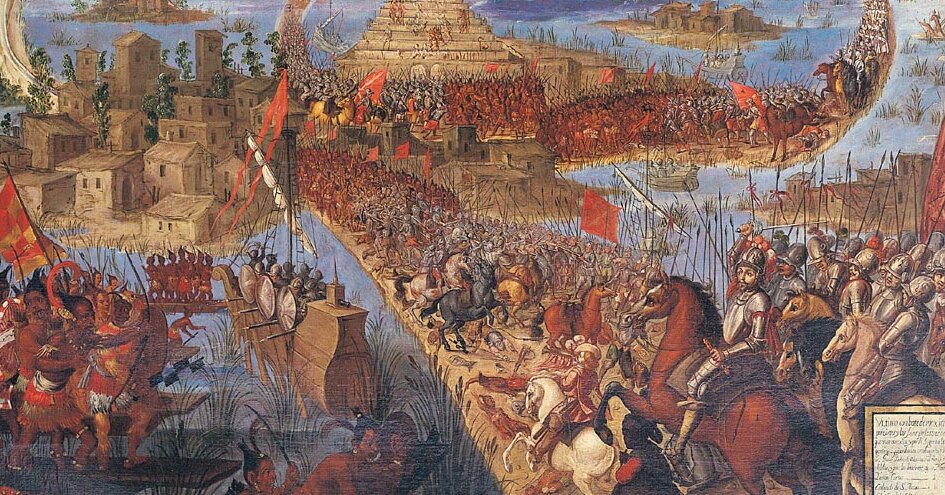MEXICO: A 500-Year History, by Paul Gillingham
As I sat down to read Paul Gillingham’s enormous but enjoyable “Mexico: A 500-Year History,” the newspapers back home in Mexico were once again focused on the recurring drama of political violence. An independent, democratically elected, ranchero-style mayor of the midsize city of Uruapan had been gunned down by a teenage sicario at the behest of a drug cartel.
The suspected killer (who was shot dead after being apprehended) was the son of a guitar maker from the town of Paracho, where members of the Indigenous Purépecha community have been making such instruments by hand since the 16th century. The shooting happened as the mayor was attending public events for Día de Muertos. A couple weeks later, protests against the national government and its handling of cartel violence had surrounded the presidential residence in Mexico City and spread across the country.
At least since the failure of the liberal coalition overseen by President Francisco Madero — assassinated in a coup in 1913 after less than two years in power — Mexico’s history has been told again and again as the slow-motion drama of a nation condemned to reach for but never grasp its democratic destiny. It’s as if the only legitimate way of becoming a valid, adult country was to achieve a durable U.S.-style electoral system, with a pristine federal authority maintaining a network of orderly representative governments.
At times, though, as Gillingham makes clear, democracy of the Mexican variety has outshined the American kind. Slavery was abolished in 1837, some two decades ahead of Emancipation in the United States. And even during the really dark and convoluted years of the country’s republic in the early 19th century, Gillingham asserts, “Mexicans enjoyed a wider suffrage than either the United States or Britain.”
Gillingham is an American scholar of Mexican history and politics at Northwestern University. Maybe because he has witnessed the slow erosion of U.S. liberal democracy over the past several years, he takes a subtler approach to the Mexican practice of self-government and the strategies that have secured, until now, the country’s national integrity.
He understands, as Mexicans do, that it is a miracle that the country exists at all, especially when one considers that the very diverse people who have called Mexico home have coexisted there for five centuries despite the violence and strife that resulted from its frequent tugs of war with the Spanish and French empires. We have also tolerated 200 years of relentless U.S. bullying.
Imposing at 700 pages, Gillingham’s book is nevertheless an engrossing read, from the droll cadences of its skeptical first line describing the embellished Spanish estimates of the Indigenous armies they encountered: “The numbers in what we call the conquest of Mexico, like the stories, tend not to add up.” Gillingham can also be charmingly informal. He refers to the never-ending tours of President Lázaro Cárdenas in the 1930s as “sweaty political banquets,” and he defines pulque, an ancient, sacred drink that has become fashionable among urban youth, as “viscous, milky-colored and horrid — or at least, an acquired taste.” (My Mexican nieces and nephews would not agree.)
“Mexico” dutifully chronicles great human displacements and epic battles, and Gillingham returns constantly to the global economic forces that shaped every period in the country’s history, from the 1826 stock market collapse in London that tanked the value of Mexican bonds just as the first republic was born to the discovery of gold in San Francisco in 1848 that would have nearly paid off the national debt, if only it had not come just eight days after Mexico was forced to cede California to the United States.
But this is not where the author’s heart lies. On page after page, his narrative remains grounded in the smaller-scale experience of the communities that persisted under a power that has always been more spectacular than strong. “From the outset,” he says, “Mexico lacked one of the main attributes of a functioning state: a legitimate monopoly on violence.”
Throughout his book, Gillingham tends to fall for the people’s people: He understands the charismatic appeal of the guerrilla leader Francisco Villa, who led the immense Northern Division of the revolutionary army in 1914, and is still a divisive figure for his brutal methods. He commiserates with Gen. Antonio López de Santa Anna, a brilliant strategist who lost Texas because he took a nap in 1836. And he takes a respectful critical distance from the flirtations with celebrity of the Zapatista spokesman, Subcomandante Marcos, who helped to popularize the Indigenous movement for the international press at the turn of the 21st century.
“Mexico” does sustain the very rude tradition of marking the beginning of the land’s history with the arrival of Europeans, but Gillingham does this because he thinks that what was truly distinctive about New Spain — and the Mexican republic that followed it — is the fact that this was the first place on earth in which so many radically different communities had to find a way to share common values, feelings and traditions.
It was the coming of the Europeans, he notes, that ushered in the enormous migrations of free and enslaved people from Africa and Asia to the other side of the world — not to mention the Philippines, which was a part of New Spain from 1565 to 1821.
Mexico boasts a legacy of firsts that Gillingham rightly celebrates: the first country in the continental Americas to elect a Black president, the only country in North America that has had an Indigenous president.
If Gillingham’s history inspires any particular explanation for the survival and success of Mexico as a nation, it would rest in the early establishment of policies and practices of governance that have held in balance two spheres of power: national authoritarian impulses — in some periods strong, in others understated — in perpetual negotiation with local authorities who genuinely represent smaller communities. (That negotiation hasn’t always looked pretty, but it has produced an incredibly stable republic: Since 1921 all transfers of power have followed a relatively clean, peaceful choreography.)
Members of the national and local spheres of power understand their mutual dependence and tend to collaborate, until they don’t, as in the War of Independence that ended in 1821 or the Revolution of 1910. From Gillingham’s point of view, what seems to define the history of Mexico is not its approximations of formal democracy, or its stubborn resistance to external powers, but the fact that it is a quintessentially fluid mestizo republic.
There is a revealing story that Gillingham tells at the end of a chapter about the War of Independence and its aftermath. Around 1840, an hacienda master in the state of Yucatán tried to impose a new leader on the Mayan community of Nohcacab. An election was held and the adult men of the town lined up to fill their ballots in support of the master’s candidate. Later, according to Gillingham, the same men held an assembly and picked another leader democratically. The people of Nohcacab carried on with the government they wanted, as they had always done — and maybe still do.
MEXICO: A 500-Year History | By Paul Gillingham | Atlantic Monthly Press | 736 pp. | $35
The post It’s a Miracle That Mexico Exists at All appeared first on New York Times.




